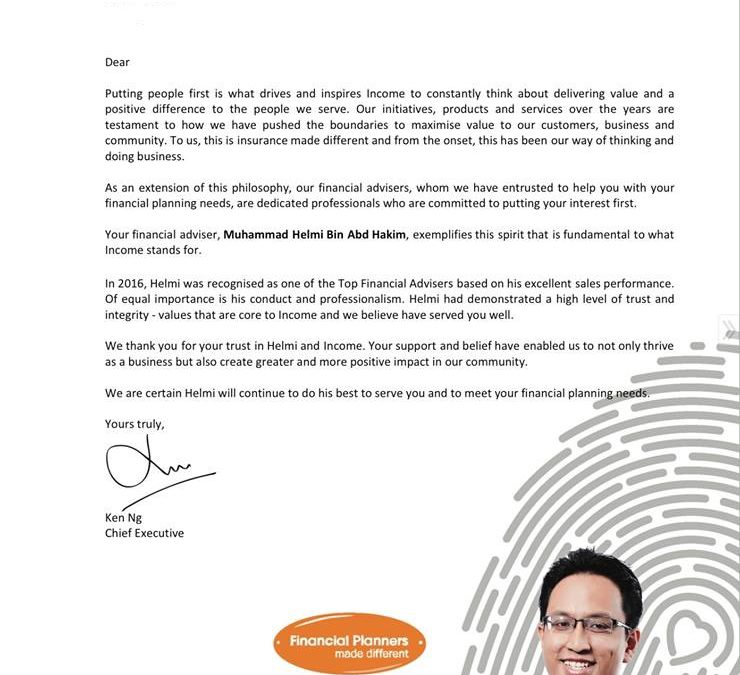
by Helmi Hakim | Oct 10, 2017 | Insurance
Alhamdulillah. I am one of the top financial advisors in Income. 🙂
Thank you to my family, friends and clients who believe in what I do.
To promote cooperative insurance and shariah compliant fund in Singapore.

…
Your support means a lot to me. Thank you once again! 🙂
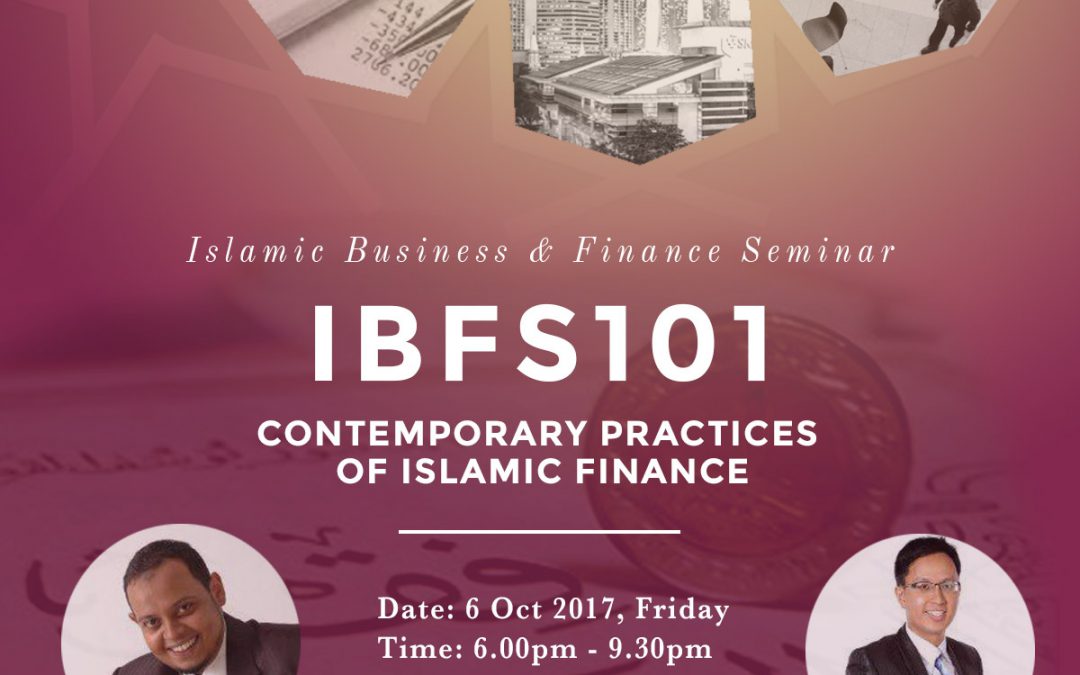
by Helmi Hakim | Oct 5, 2017 | Investment
Many of you might have known me as the financial consultant that helps Muslim families plan their finances in a shariah compliant way in Singapore.
This time round, I am honoured to be invited to speak on the topic, “Shariah Compliant Ways To Save More Money in Singapore”.
Alongside reputable lawyer, Mr Abdul Rahman from Abdul Rahman Law Corporation.

It will be held on 6th October 2017 (Friday), from 6pm to 9.30pm.
The seminar is FREE. If you are interested, do register at http://www.smums.org/ibfs-seminar
Seats are limited. See you soon. Insya’Allah! 🙂

by Helmi Hakim | Sep 17, 2017 | Investment
A lot of people have asked me.
“Helmi Hakim. I want to buy a house in Singapore. I dont have money to pay full in cash thus I have to take a loan.
Is there shariah compliant home financing facility in Singapore?”
………………………………..
………………
……….
I have made it clear that there is NO shariah compliant home financing facility in Singapore at this point of time.
That’s why I created Takaful.sg with my unique Your Financial M.A.P. Model™ to share simple yet powerful strategies on how you can clear your Riba Based loans in Singapore.
You can schedule a FREE consultation with me to find out more. Click here.
(Your Financial M.A.P. session)
In this blog post, I am going to share with you how shariah compliant home financing facilities actually work.
This is because a lot of people have been asking me- thus I devote a bit of my time to create this blog post. 🙂
…………………………………..
………………..
………….
In this world, there are 3 types of shariah compliant home financing facilities.
- Murabaha
- Ijarah Wa Iqtina
- Diminishing Musharakah
I will explain from an Islamic Finance practitioner point of view in Singapore, and in layman terms.
1) Murabaha
In a Murabaha or cost plus financing, you select a property and the financial institution acquires it.
The financial institution adds its profit and sells the asset to you at an agreed upon price on a deferred, usually installment basis.
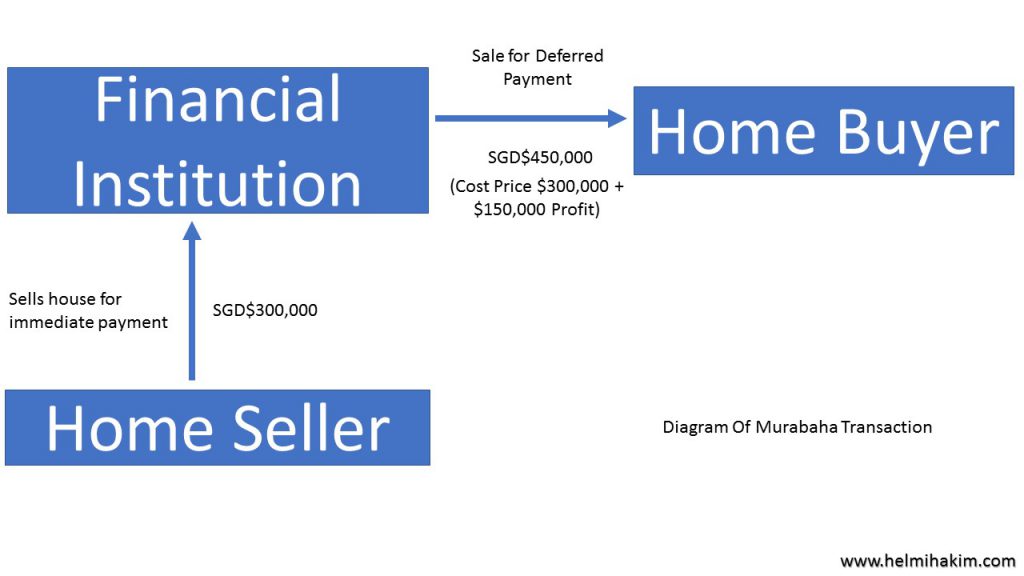
Its like a shopkeeper who sells you goods on credit.
(Cost Price + Profit), you pay back to the shopkeeper on a deferred, usually installment basis.
This is real trade, in accordance with the Quranic injunction:
‘Allah has permitted trading and forbidden interest’.
This transaction is permissible in Islam.
…..
.
It is important to note that there MUST be a transfer of ownership from the home seller to the financial institution.
Financial Institution must owned the property first,
then only it can sell it to you, the home buyer.
This is in conjunction with the hadith of Hakeem ibn Hizaam and ‘Abdullah ibn ‘Amr (may Allah be pleased with them both),
Prophet Muhammad (Peace Be Upon Him) mentioned
“Do not sell, what you do not own.”
In Islamic Finance perspective, if the Financial Institution does not own the property, it cannot sell it to you, the home buyer.
………………………………….
………………….
……….
2) Ijarah Wa Iqtina or Ijarah Muntahia Bi’l Tamblik
In an Ijarah or Islamic lease, the financial institution acting as a lessor, buys a property and rents it out to you, the lessee client.
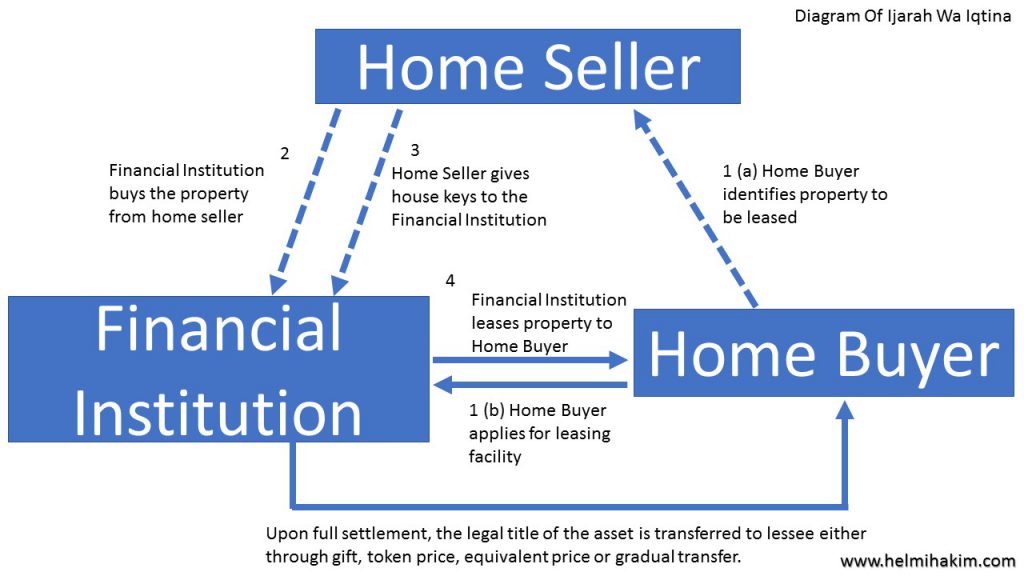
Much later, as part of a seperate agreement, the financial institution offers to sell the property to you.
Transfer the ownership to you through gift.
OR ask you to pay the remaining Ijarah instalments before end of lease term
and after that transfer the ownership of property to you through transfer of legal title.
This is permissible in Islam.
………………………………….
………………….
3) Diminishing Musharakah (Musharakah Mutanaqisah)
In a Diminishing Musharakah, the financial institution and you as the home buyer become partners.
And purchase the property jointly.

You, as the home buyer move into the property.
Perhaps the property is worth SGD200,000. You pay 10% of the price (SGD20,000) as downpayment.
The Financial Institution takes care of the other 90% of the price (SGD180,000).
This agreement results in 10% home ownership belonging to you, the home buyer.
And the remaining 90% to the Financial Institution.
You then gradually acquire the financial institution’s equity shares in the property.
Until all shares are completely transferred to you.
At the same time, you pay rent in proportion to the financial institution’s remaining equity shares,
with each successive rental payment “diminishing” to the extend of the financial institution’s reduction in its share of the property.
The END result, you will own the property 100% completely, thus no longer needs to pay rental.
At no time, you as the homebuyer pay any interest (riba).
You only pay 2 things. Firstly, the house, in small payments, bit by bit.
Secondly, the rent, for the portion of the house which you have not owned yet.
This is permissible in Islam.
(Explanation adapted from Understanding Shari’ah and its application in Islamic Finance (IBIFM)
& Ethica Certified Islamic Finance Handbook)
…………………………….
………………….
……………….
As you can see above, the key difference between conventional mortgage and a shariah compliant home financing is that conventional mortgage involves loan of cash on interest, whereas a shariah compliant home financing is strictly the exchange of assets.
Each of the above transactions involves an asset and actual ownership by the financial institution. Ultimately, the financial institution must own some (Diminishing Musharakah) or all (Ijarah Wa Iqtina and Murabaha) of the asset for it to be Islamically acceptable.
Insya’Allah, when shariah compliant home financing facility is introduced in Singapore in the near future, I will be exploring strategies on property investment too.
As of now, if you are looking on the practical aspects on how you can save, accumulate and grow your money the shariah compliant way in Singapore, you can always whatsapp/sms me at 96520134 to schedule a FREE consultation.
Or perhaps click here to schedule an appointment.
You will want to schedule it asap because I can only accomodate 5 slots per week.
Click here to schedule your FREE consultation today!
Take Care! 🙂
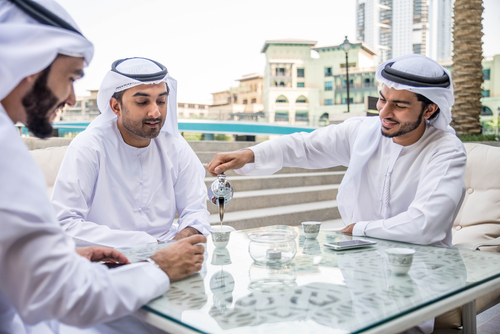
by Helmi Hakim | Aug 28, 2017 | Investment
Myth #1: It is EXPENSIVE. It is only reserved for the rich Arabs.

(Arabic Businessmen enjoying a cup of tea)
.
.
Helmi Hakim’s answer: Not true. You can start investing in shariah compliant funds with as little as $5/day or $150/mth.
Gone are the days where shariah compliant instruments are reserved only for the rich and institutional investors with minimal investment amount of $200,000.
Today, common man on the streets in Singapore can also be a shariah compliant investor, with only SGD$150/mth.
………………………………………………
…………………………………..
Myth #2: It is obsolete. It is backward. Some lament that Islamic Finance use ancient strategies. More than 1400 years ago.
Might no longer be applicable today.
Today is modern times. Modern times must use modern investment strategies.
.
.
.
Helmi Hakim’s answer: Not true.
In reality, Islamic Finance have timeless principles as stipulated in the holy Quran and Sunnah of our beloved Prophet Muhammad (Peace and Blessings Be Upon Him) which are relevant and applicable till the day of judgement.
The pertinent principles (no riba, no maysir, no gharar) haven’t change. The application perhaps have changed.
How we apply the pertinent principles essentially does change over time because the modern financial world and business as we know it today is very different to what happened 1400 years ago.
So essentially the modern financial Islamic Finance industry is about taking those crucial, pertinent principles.
And apply them in the modern context.
No riba. No Maysir. No Gharar. In the context of the 21st Century.
In fact, I can argue that most global financial problems in the world today happens because of Riba (Interest), Maysir (Speculation) and Gharar (Uncertainty).
Be it the subprime mortgage crisis in year 2008, the Asian financial crisis in year 1997, Euro Debt Crisis, 1MDB saga, anything you can think of.
Allah S.W.T. has given us the prescriptions to the global economic ailments in the holy Quran and sunnah of our beloved Prophet Muhammad (Peace and Blessings Be Upon Him).
Why don’t we just follow them?
Of course, if I were to lay down everything here, my post will never end.
You can schedule a free consultation session with me to discuss more. Insya’Allah. 🙂
……………………………………………
…………………………..
Myth #3: It is FAKE.
Yek Eleh… They just replace the word “interest” with the word “profits”.
It is still conventional. But just dressed up as Halal.
.
.
.
Helmi Hakim’s answer: Not true.
Name me any Islamic financial contracts. In essence, all of them are free from riba (interest), maysir and gharar.
Let me explain with a simple example.
Example, I set up a chicken rice stall.
Alhamdulillah.
My chicken rice is delicious.

A lot of customers queue to buy my chicken rice every day.
As a businessman, because I have one chicken rice stall that is so profitable, I want to expand my business.
I want to open up more stalls selling my delicious chicken rice.
Perhaps now my stall is in Tampines.
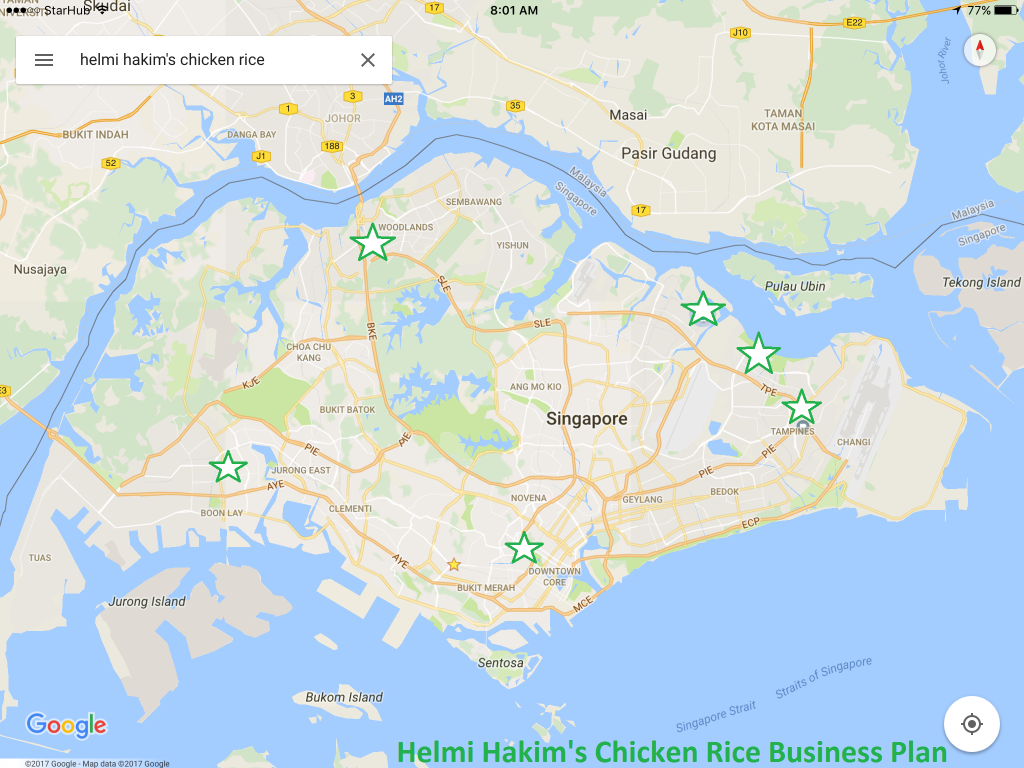
(Copyright belongs to Google Map)
I want to open one in Punggol, one in Pasir Ris, one in Woodlands, one in Jurong West and one in Somerset.
But, I dont have much money.
So what I do, I become a bond issuer. I approach people like yourself.
You give me $100,000.
I promise you that every quarter, or every half year or perhaps every year, I will give you money.
Regardless, my new chicken rice stall makes money OR lose money,
I will still give you money.
The money that I give you is called coupons.
From shariah compliant perspective, the coupons is not permissible because it is still known as interest and essentially riba.
……………………………………………..
………………………
…………….
So how do we do it the shariah compliant way?
Again, I approach you.
This time round, I invite you to be my business partner in this new stall.
You run the stall for me.
I share with you my secret delicious chicken rice recipe.
At the end of the day, we share our profit and loss.
You take 70%, I take 30%. This is allowed from shariah perspectives.
In Islamic Finance, it is known as Musharakah.
………………………
………………
….
For another stall, I approach my friend.
This time round, my friend told me that he doesn’t want to run the stall.
But he wants to be an INVESTOR.
Okay. He contributes $50,000 to my new stall.
This time round, we have an agreeable profit sharing ratio.
Perhaps, I take 70% and he takes 30%.
However, if our business loses money, my friend’s loss will be limited to the $50,000 capital that he contributed.
This is allowed from shariah perspectives.
In Islamic Finance, it is known as Mudarabah.
Based on the above example,
I just like to illustrate that the application of Islamic Finance in our daily lives is REAL.
It is not just simply dressing up something that is haram to something that is Halal.
……………………………………………………….
………………………………………
Myth #4: It is DIFFICULT to understand.
It is too exotic. Too mysterious. Too unknown.
Mudarabah? Murabaha? Musharakah? Ijarah Muntahia Bithambleek?
Very confusing…
.
.
.
Helmi Hakim’s answer:
Well. The Malay proverb says, “Alah bisa, tegal biasa”.
Anything we do for the first time might feel difficult. But if we do it a lot of times, it becomes easier.
Because it becomes familiar and second nature to us.
In fact, when I first started my journey as a financial consultant in year 2007, I have ZERO educational background in Islamic Finance.
I had Diploma in Accountancy from Ngee Ann Polytechnic.
Sure! You asked me on how to interpret financial statements back then, Insya’Allah, I would be able to assist you.
But you asked me about Islamic Finance, I will stare at you with a blank face.
At that point, I just relied on the Fatwas by MUIS, our religious authority in Singapore. Nothing more than that.
Gradually, I upgrade myself.
I took my degree, Bachelor Of Science (Hons) Banking and Wealth Management with University of Wales (UK).
They have a module on Islamic Finance.
Then, I took an Islamic Finance Certification with Australia Islamic Finance Centre (AUCIF).
Currently, I am studying for my exams, Certified Islamic Finance Executive by Ethica Institute which is based in Dubai.
The point, I am trying to bring across is that we have to start somewhere.
A journey of a thousand miles began with the first step. The first step towards the right direction.
Insya’Allah, if we have set our niat right, Allah S.W.T. will guide us, show us the path and make it easier for us.
So, get started! 🙂
.
.
.
Myth #5: It is troublesome/leceh/mafan.
Make money, make money only lah. Religion should be set aside.
No need to distinguish whether it is Halal or Haram.
As long we can make money, it is for the greater good right? Why need to think too hard?
.
.
Helmi Hakim’s answer:
There are 2 ways of making money.
The shariah compliant (halal) way. And the non shariah compliant way.
If you can make money the shariah compliant way, why do it the non-shariah compliant way?
At the end of the day, you still make money right? 🙂
…………………
….
To say that making money the shariah compliant way in Singapore is troublesome is not true at all.
In fact, the basic fundamentals of how shariah compliant fund makes money and non-shariah compliant funds make money is the about the SAME.
The only difference is the underlying assets.
To do it the shariah compliant way, the underlying asset has to be shariah compliant.
No pork. No alcohol. No casinos.
And other pertinent requirements (absence of riba, maysir and gharar) to ensure that the financial transaction and the underlying assets are permissible in Islam.
Shariah compliant. Halal wa Thoyibban.
As Muslims, the practise of our beloved religion, Islam covers all aspects of our life.
Family. Community. Business.
To Ibadah. Morals and even areas such as our personal hygiene.
Islam does not adopt a secular model whereby religion plays little or no role in public affairs.
There is no segregation of ‘church’ and ‘state’ as such.
Religion and our daily lives goes hand in hand! 🙂
…………………………………………………..
…………………………………….
…………………………..
Above are just some myths that I came across when meeting hundreds of Singaporean Muslims out there, to share on how they can plan their finance, the shariah compliant way in Singapore.
If you are looking on the practical aspects on how you can save, accumulate and grow your money the shariah compliant way in Singapore, you can always whatsapp/sms me at 96520134 to schedule a FREE consultation.
Or perhaps click here to schedule an appointment.
You will want to schedule it asap because I can only accomodate 5 slots per week.
Click here to schedule your FREE consultation today!
Take Care! 🙂

by Helmi Hakim | Jul 21, 2017 | Insurance, Investment
Alhamdulillah. I just finished my 2-week army reservist. 🙂
Being in vegetation for a while with combat rations as my food supply, I was deprived of good food.
Many types of food ran into my mind.
Nasi Campur Sinar Cahaya at Pasar Geylang Serai
Roti John Steak Mama Power @ Old Woodlands
Epok Epok Ganja @ 1 Bedok Road
Everything seems so delicious at that point of time! … and then comes, this Nasi Lemak Burger by Macdonalds… 🙂

Okay lah. This is something unique.
Malay food combined with Western Food.
Nasi Lemak combined with burger.
…………………………….
…………….
Never tried before.
So the first thing I did after I outpro and relaxed at home, was to chill at Macdonalds with my wife, sharing a Nasi Lemak Burger.

As I unwrapped my burger… a nice hint of the smell of santan greeted me….
and then out came the coconut flavoured chicken thigh patty, fried egg, caramelised onions, two slices of cucumber and a smear of sambal.
Those who have tried this burger definitely would agree with me, what makes this burger special is the sambal.
The sambal is amazing!
The sweet, spicy cameralised onion sambal is so refreshing, tantalised my tastebuds, and reminded me of the RM1.50 roadside Makcik Nasi Lemak at Johor Bahru.
Sweet, yummy sambal wrapped together with Nasi Lemak in banana leaves and Utusan Malaysia newspaper.
Difficult to find in Singapore, this kind of Nasi Lemak.
Overall, I will give Macdonald Nasi Lemak burger 5/5.
……………………………………….
………………
……….
This Nasi Lemak Burger also serves as a learning lesson for Islamic Finance Practitioners in Singapore.
Nasi Lemak Burger combines the BEST of Malay food – Nasi Lemak – and the BEST of Western food – burgers.
Islamic Finance Practioners can combine the BEST practices in Islamic Financial Planning and Conventional Financial Planning.
Let me explain and give practical examples.
………………………………………………………………………………
…………………………………
For Islamic Financial Planning, we save our contingency/emergency funds in Al Wadiah Savings Account.
Alhamdulillah, we know it is shariah compliant because it gives Hibah instead of Interest.
How much to save as contingency funds?
Best practices in conventional finance is to adopt a basic liquidity ratio of 3-6 months.
It means you can have 3-6 months of your monthly expenses in your Al Wadiah Savings account.
……………………………………
…………………….
…………
In Islamic Financial Planning, we know in order to buy a house, the shariah compliant way is to use Murabahah, Diminishing Musharakah or Ijarah Wa Iqtina financing facilities.
In the future, once shariah compliant home financing is available in Singapore, we don’t overleverage and immediately
buy properties worth millions of dollars.
Take millions of dollars of shariah compliant financing because it is shariah compliant.
No. We dont do that.
We follow the best practices in conventional finance which is to follow closely this ratio known as,
Total Debt Service Ratio (TDSR).
TDSR= Total Debt Yearly Repayment/Annualised Take Home Pay
This ratio measures the proportion of take home income, used to make regular payment of debts.
If it is lower than 35%, means HEALTHY.
It means that there is sufficient take home pay available to service debt repayments.
A ratio of 45% or above for this ratio is generally considered unhealthy and may risk of not being able to service these regular debt repayments.
Follow the recommended TDSR guidelines, even though if the financing facilities are shariah compliant.
Dont overleverage.
…………………………………………………
…………………………….
…………………..
When you invest your money the shariah compliant way for your retirement, you can follow certain personal financial ratio guidelines.
…………………..
.
Savings Ratio = Savings/Gross Income
This ratio calculate the proportion of your income, you set up for savings.
You need to save at least minimum 10% of your gross income.
Gross income in this formula should be taken from the cashflow statement.
(Click here to download a free report on how you can create your own cashflow statement)
…………………….
………………
Investment Assets To Net Worth Ratio = Invested Assets/Networth
This ratio compares the value of invested assets with networth.
An individual should have clear targets on accumulating capital for the longer term, excluding investment in the house that you are staying in.
The target is to have sufficient assets accumulated for retirement and other financial purposes.
If it is more than 50%, means HEALTHY.
……………………………………………….
………………………..
……..
Above are just some best practices in conventional finance that I personally adopt to my Islamic Financial Planning services.
If you are looking on the practical aspects on how you can save, accumulate and grow your money the shariah compliant way in Singapore,
you can always whatsapp/sms me at 96520134 to schedule a FREE consultation.
Or perhaps click here to schedule an appointment.
You will want to schedule it asap because I can only accomodate 5 slots per week.
And next week, I will be heading for my long holiday to Oman and Dubai. Insya’Allah.
Click here to schedule your FREE consultation today!
Take Care! 🙂















